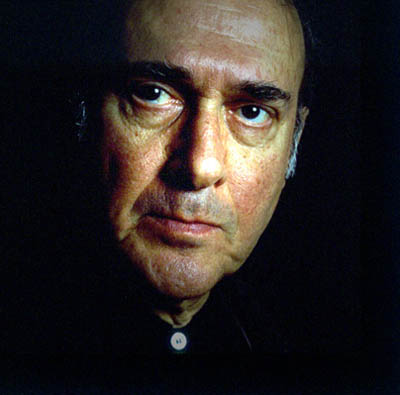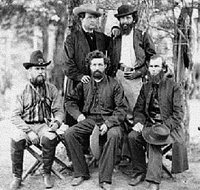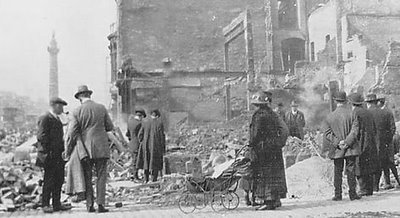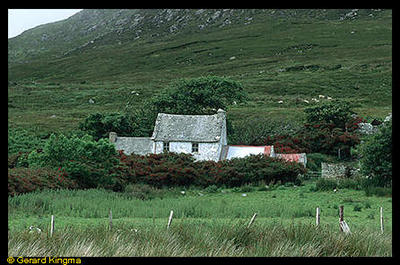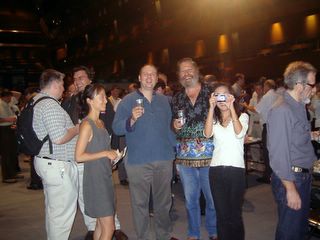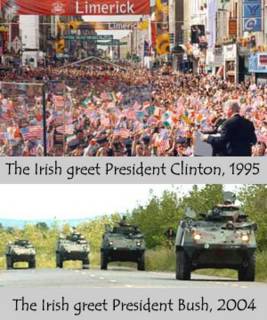 Carole Coleman's interview with President Bush for Irish television
Carole Coleman's interview with President Bush for Irish television“Is that how you do it in Ireland — interrupting people all the time?”
I froze. He was not happy with me and was letting me know it.
“Yes,” I stuttered, ....
10/09/05 "Sunday Times" -- -- (excerpt)
Mr President,” I began. “You will arrive in Ireland in less than 24 hours’ time. While our political leaders will welcome you, unfortunately the majority of our people will not. They are annoyed about the war in Iraq and about Abu Ghraib. Are you bothered by what Irish people think?”
The president was reclining in his seat and had a half-smile on his face, a smile I had often seen when he had to deal with something he would rather not.
“Listen. I hope the Irish people understand the great values of our country. And if they think that a few soldiers represent the entirety of America, they don’t really understand America then . . . We are a compassionate country. We’re a strong country, and we’ll defend ourselves. But we help people. And we’ve helped the Irish and we’ll continue to do so. We’ve got a good relationship with Ireland.”
“And they are angry over Iraq as well and particularly the continuing death toll there,” I added, moving him on to the war that had claimed 100 Iraqi lives that very day. He continued to smile, but just barely.
“Well, I can understand that. People don’t like war. But what they should be angry about is the fact that there was a brutal dictator there that had destroyed lives and put them in mass graves and torture rooms . . . Look, Saddam Hussein had used weapons of mass destruction against his own people, against the neighbourhood. He was a brutal dictator who posed a threat that the United Nations voted unanimously to say, Mr Saddam Hussein . . .”
Having noted the tone of my questions, the president had now sat forward in his chair and had become animated, gesturing with his hands for emphasis. But as I listened to the history of Saddam Hussein and the weapons inspectors and the UN resolutions, my heart was sinking. He was resorting to the type of meandering stock answer I had heard scores of times and had hoped to avoid. Going back over this old ground could take two or three minutes and allow him to keep talking without dealing with the current state of the war. It was a filibuster of sorts. If I didn’t challenge him, the interview would be a wasted opportunity.
“But, Mr President, you didn’t find any weapons,” I interjected.
“Let me finish, let me finish. May I finish?”
With his hand raised, he requested that I stop speaking. He paused and looked me straight in the eye to make sure I had got the message. He wanted to continue, so I backed off and he went on. “The United Nations said, ‘Disarm or face serious consequences’. That’s what the United Nations said. And guess what? He didn’t disarm. He didn’t disclose his arms. And therefore he faced serious consequences. But we have found a capacity for him to make a weapon. See, he had the capacity to make weapons . . .”
I was now beginning to feel shut out of this event. He had the floor and he wasn’t letting me dance. My blood was boiling to such a point that I felt like slapping him. But I was dealing with the president of the United States; and he was too far away anyway. I suppose I had been naive to think that he was making himself available to me so I could spar with him or plumb the depths of his thought processes. Sitting there, I knew that I was nobody special and that this was just another opportunity for the president to repeat his mantra. He seemed irked to be faced with someone who wasn’t nodding gravely at him as he was speaking.
“But Mr President,” I interrupted again, “the world is a more dangerous place today. I don’t know whether you can see that or not.”
“Why do you say that?”
“There are terrorist bombings every single day. It’s now a daily event. It wasn’t like that two years ago.”
“What was it like on September 11 2001? It was a . . . there was relative calm, we . . .”
“But it’s your response to Iraq that’s considered . . .”
“Let me finish. Let me finish. Please. You ask the questions and I’ll answer them, if you don’t mind.”
His hand was raised again as if to indicate that he was not going to tolerate this. Again, I felt I had no choice but to keep quiet.
“On September 11 2001, we were attacked in an unprovoked fashion. Everybody thought the world was calm. There have been bombings since then — not because of my response to Iraq. There were bombings in Madrid, there were bombings in Istanbul. There were bombings in Bali. There were killings in Pakistan.”
He seemed to be finished, so I took a deep breath and tried once again. So far, facial expressions were defining this interview as much as anything that was said, so I focused on looking as if I was genuinely trying to fathom him.
“Indeed, Mr President, and I think Irish people understand that. But I think there is a feeling that the world has become a more dangerous place because you have taken the focus off Al-Qaeda and diverted into Iraq. Do you not see that the world is a more dangerous place? I saw four of your soldiers lying dead on the television the other day, a picture of four soldiers just lying there without their flak jackets.”
“Listen, nobody cares more about death than I do . . .”
“Is there a point or place . . .”
“Let me finish. Please. Let me finish, and then you can follow up, if you don’t mind.”
By now he was getting used to the rhythm of this interview and didn’t seem quite so taken aback by my attempt to take control of it. “Nobody cares more about death than I do. I care a lot about it. But I do believe the world is a safer place and becoming a safer place. I know that a free Iraq is going to be a necessary part of changing the world.”
The president seemed to be talking more openly now and from the heart rather than from a script. The history lesson on Saddam was over. “Listen, people join terrorist organisations because there’s no hope and there’s no chance to raise their families in a peaceful world where there is not freedom. And so the idea is to promote freedom and at the same time protect our security. And I do believe the world is becoming a better place, absolutely.”
I could not tell how much time had elapsed, maybe five or six minutes, so I moved quickly on to the question I most wanted to ask George Bush in person.
“Mr President, you are a man who has a great faith in God. I’ve heard you say many times that you strive to serve somebody greater than yourself.”
“Right.”
“Do you believe that the hand of God is guiding you in this war on terror?”
This question had been on my mind ever since September 11, when Bush began to invoke God in his speeches. He spoke as if he believed that his job of stewarding America through the attacks and beyond was somehow preordained, that he had been chosen for this role. He closed his eyes as he began to answer.
“Listen, I think that God . . . that my relationship with God is a very personal relationship. And I turn to the Good Lord for strength. I turn to the Good Lord for guidance. I turn to the Good Lord for forgiveness. But the God I know is not one that . . . the God I know is one that promotes peace and freedom. But I get great sustenance from my personal relationship.”
He sat forward again. “That doesn’t make me think I’m a better person than you are, by the way. Because one of the great admonitions in the Good Book is, ‘Don’t try to take a speck out of your eye if I’ve got a log in my own’.”
I suspected that he was also telling me that I should not judge him.
I switched to Ireland again and to the controversy then raging over the Irish government’s decision to allow the use of Shannon Airport for the transport of soldiers and weapons to the Gulf.
“You are going to meet Bertie Ahern when you arrive at Shannon Airport tomorrow. I guess he went out on a limb for you, presumably because of the great friendship between our two countries. Can you look him in the eye when you get there and say, ‘It will be worth it, it will work out’?”
“Absolutely. I wouldn’t be doing this, I wouldn’t have made the decision I did if I didn’t think the world would be better.”
I felt that the President had now become personally involved in this interview, even quoting a Bible passage, so I made one more stab at trying to get inside his head.
“Why is it that others don’t understand what you are about?”
He shrugged. “I don’t know. History will judge what I’m about.”
I could not remember my next question. My mind had gone completely blank. The president had not removed me from his gaze since we had begun and I wanted to keep up the eye contact.
If I diverted to my notes on the table beside me, he would know he had flustered me. For what seemed like an eternity, but probably no more than two seconds, I stared at him, searching his eyes for inspiration. It finally came.
“Can I just turn to the Middle East?”
“Sure.”
He talked about his personal commitment to solving that conflict. As he did so, I could see one of the White House crew signalling for me to wrap up the interview, but the president was in full flight.
“Like Iraq, the Palestinian and the Israeli issue is going to require good security measures,” he said.
Now out of time, I was fully aware that another question was pushing it, but I would never be here again and I had spent four years covering an administration that appeared to favour Israel at every turn.
“And perhaps a bit more even-handedness from America?” I asked, though it came out more as a comment.
The president did not see the look of horror on the faces of his staff as he began to defend his stance. “I’m the first president to have called for a Palestinian state. That to me sounds like a reasonable and balanced approach. I will not allow terrorists determine the fate, as best I can, of people who want to be free.”
Hands were signalling furiously now for me to end the interview.
“Mr President, thank you very much.”
“You’re welcome,” he replied, still half-smiling and half-frowning.
It was over. I felt like a delinquent child who had been reprimanded by a stern, unwavering father. My face must have been the same colour as my suit. Yet I also knew that we had discussed some important issues — probably more candidly than I had heard from President Bush in some time.
I was removing my microphone when he addressed me.
“Is that how you do it in Ireland — interrupting people all the time?”
I froze. He was not happy with me and was letting me know it.
“Yes,” I stuttered, determined to maintain my own half-smile.
I was aching to get out of there for a breath of air when I remembered that I had earlier discussed with staff the possibility of having my picture taken with the president. I had been told that, when the interview was over, I could stand up with him and the White House photographer would snap a picture. Not wanting to waste the opportunity, I stood up and asked him to join me.
“Oh, she wants the photograph now,” he said from his still-seated position. He rose, stood beside me and put an arm around my shoulder. Taking his cue, I put an arm up around his shoulder and we both grinned for the cameras.
In my haste to leave I almost forgot the tapes and had to be reminded by the film crew to take them. I and my assistants bolted out to the street. We ran, high heels and all, across Lafayette Park. Running through rush-hour traffic, I thought that this had to be about as crazy as a journalist’s job gets.
I had just been admonished by the president of the United States and now I was turning cartwheels in order to get the interview on air. As I dashed past a waste bin, I had a fleeting urge to throw in the tapes and run home instead.
At the studio I handed over the tapes. My phone rang. It was MC, and her voice was cold.
“We just want to say how disappointed we are in the way you conducted the interview,” she said.
“How is that?” I asked.
“You talked over the president, not letting him finish his answers.”
“Oh, I was just moving him on,” I said, explaining that I wanted some new insight from him, not two-year-old answers.
“He did give you plenty of new stuff.”
She estimated that I had interrupted the president eight times and added that I had upset him. I was upset too, I told her. The line started to break up; I was in a basement with a bad phone signal. I took her number and agreed to call her back. I dialled the White House number and she was on the line again.
“I’m here with Colby,” she indicated.
“Right.”
“You were given an opportunity to interview the leader of the free world and you blew it,” she began.
I was beginning to feel as if I might be dreaming. I had naively believed the American president was referred to as the “leader of the free world” only in an unofficial tongue-in-cheek sort of way by outsiders, and not among his closest staff.
“You were more vicious than any of the White House press corps or even some of them up on Capitol Hill . . .The president leads the interview,” she said.
“I don’t agree,” I replied, my initial worry now turning to frustration. “It’s the journalist’s job to lead the interview.”
It was suggested that perhaps I could edit the tapes to take out the interruptions, but I made it clear that this would not be possible.
As the conversation progressed, I learnt that I might find it difficult to secure further co-operation from the White House. A man’s voice then came on the line. Colby, I assumed. “And, it goes without saying, you can forget about the interview with Laura Bush.”
Clearly the White House had thought they would be dealing with an Irish “colleen” bowled over by the opportunity to interview the Bushes. If anyone there had done their research on RTE’s interviewing techniques, they might have known better.
MC also indicated that she would be contacting the Irish Embassy in Washington — in other words, an official complaint from Washington to Dublin.
“I don’t know how we are going to repair this relationship, but have a safe trip back to Ireland,” MC concluded. I told her I had not meant to upset her since she had been more than helpful to me. The conversation ended.
By the time I got to the control room, the Prime Time broadcast had just started. It was at the point of the first confrontation with the “leader of the free world” and those gathered around the monitors were glued to it. “Well done,” someone said. “This is great.”
I thought about the interview again as I climbed up the steps to RTE’s live camera position at Dromoland Castle to account for myself on the 6pm news next day. By now the White House had vented its anger to the Irish embassy in Washington. To make matters worse for the administration, the interview had made its way onto American television and CNN was replaying it around the world and by the end of the day it had been aired in Baghdad.
Had I been fair? Should I just have been more deferential to George Bush? I felt that I had simply done my job and shuddered at the thought of the backlash I would surely have faced in Ireland had I not challenged the president on matters that had changed the way America was viewed around the world.
Afterwards I bumped straight into the taoiseach, Bertie Ahern, who was waiting to go on air.
“Howya,” he said, winking.
“I hope this hasn’t caused you too much hassle, taoiseach,” I blurted.
“Arrah, don’t worry at all; you haven’t caused me one bit of hassle,” he smiled wryly.
I don’t know what he said to the president, who reportedly referred to the interview immediately upon arrival, but if the taoiseach was annoyed with me or with RTE, he didn’t show it.
When I returned to my little world on the street called M in Washington, I felt a tad more conspicuous than when I’d left for Ireland. Google was returning more than 100,000 results on the subject of the 12-minute interview. The vast majority of bloggers felt it was time a reporter had challenged Bush.
(This article is extracted from the opening chapter of Alleluia America! by Carole Coleman, to be published by The Liffey Press on October 14 at €14.95.)

